Hello and welcome to ‘Focused on Feld’. In my Focused on Feld series of reviews, I am working my way through Stefan Feld’s entire catalogue. Over the years, I have hunted down and collected every title he has ever put out. Needless to say, I’m a fan of his work. I’m such a fan, in fact, that when I noticed there were no active Stefan Feld fan groups on Facebook, I created one of my own.
Today we’re going to talk about 2011’s Strasbourg, his 14th game.
As mentioned in my review of Trajan, Stefan Feld really hit the ground running in 2011. Sandwiched in between the release of his masterpieces The Castles of Burgundy and Trajan was Strasbourg, an unassuming game about noble families in the French city of Strasbourg during the 15th century, squabbling for power and influence within the city’s guilds. It was the first, and so far (thankfully) the only game Feld has ever produced that requires a minimum of three people to play. Perhaps that’s the reason that Strasbourg never got the traction, or attention, of the games that bookended it.
Overview
In Strasbourg, each player begins the game with an identical set of shuffled cards, and they will use these cards to bid on the game’s various actions over the course of five game rounds.
Each of the game’s rounds are divided into a number of bidding phases. At the start of the round, players will draw as many cards from their deck as they wish and then create Influence stacks using those cards. As each potential action comes up for bid during the round, the players may opt to bid for that action using one of their Influence stacks. If they win the bid, they get to take the action at its maximum impact. Some actions reward the other players lesser awards based on where they placed in their total bids after the bids were collected. The tricky part is that players do not get to recycle their decks. Once they’ve used all of their cards, that’s it. They can no longer participate in future bidding.
The game’s actions let you do things such as send Family Members to the city council to score points as well as collect goods from the various guilds, sell those goods for money, and use that money to place your Family Members onto the game board in order to try to fulfill your secret objectives (end of game points). After the fifth round comes to an end, some additional end-of-game scoring is performed, and the player with the most points wins.
Of course, this is just a high-level overview of the game. If you already know how to play or think you’ve heard enough and just want to know what I think, feel free to skip ahead to the Thoughts section. Otherwise, read on as we learn how to play Strasbourg.
Setup
A game of Strasbourg is set up thusly:
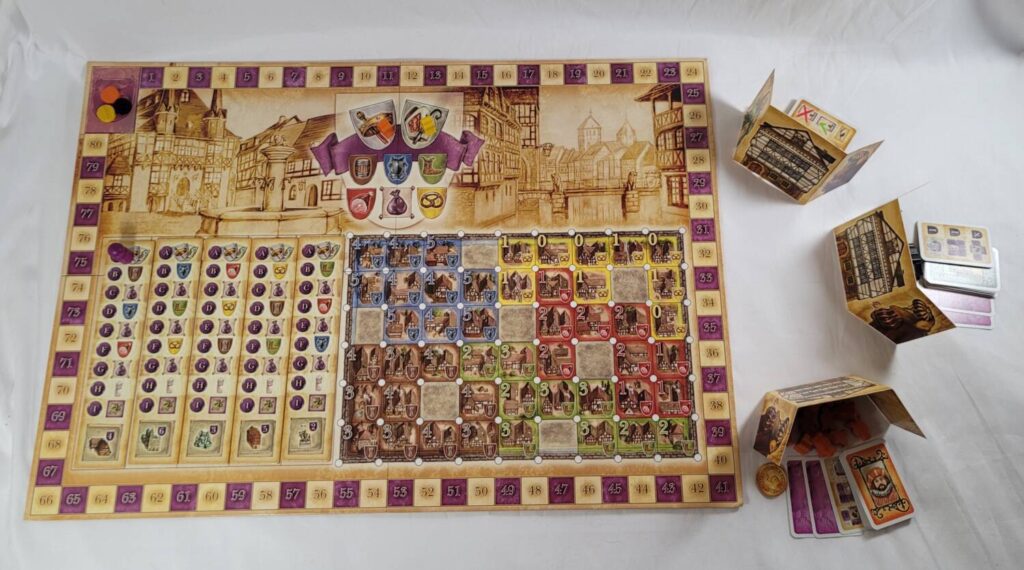
First, place the game board on the table, shuffle the five Round cards, and place them in a random order face up in their marked spot. Then, shuffle the five Edifice tiles and place one at the bottom of each of the Round cards. Place the Round marker on the space labeled ‘A’ on the leftmost Round card.
Next, each player will select a color and take the matching components along with a Player screen and a value of coins equal to five. The players place their Prestige markers on the 0 space of the Prestige Path. Then, a starting player is chosen. This player places one of their Family Members into the Nobility’s Seat of the Council. The next player places one of theirs into the Church’s Seat. The other Council seats remain unoccupied.
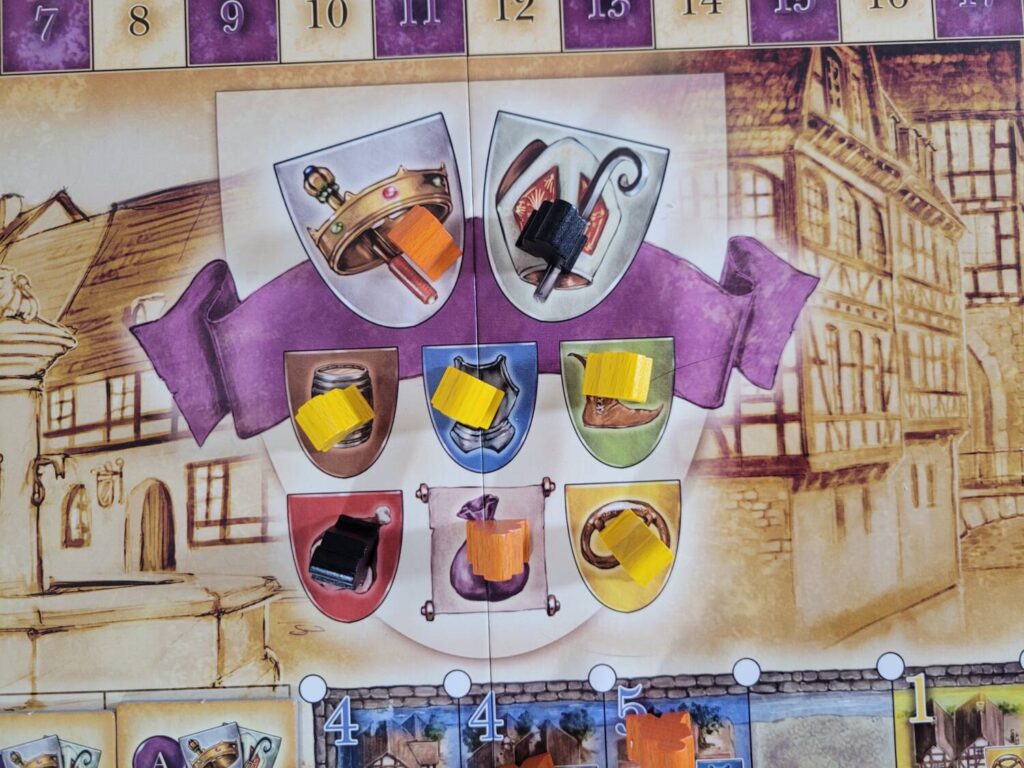
Finally, each player receives five random Task cards. Each Task card lists some criteria that must be met by the time the game ends in order for the card to score—have three Family Members in a diagonal row within the city, for example. The players select between one and five they wish to keep (these are kept secret behind their screen), and return those not kept to the box.
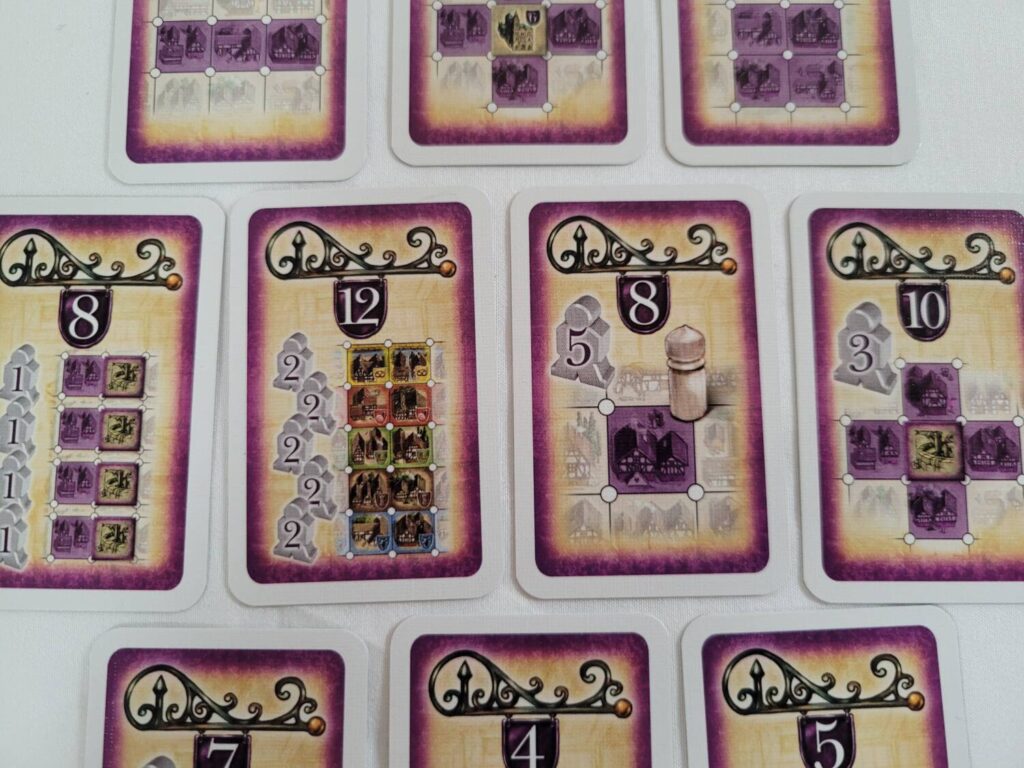
Now, you’re ready to begin playing.
Flow of Play
Each of Strasbourg’s five game rounds is broken down into three distinct phases: the Planning phase, the Action phase, and the Council phase.
In the Planning phase, the players will draw cards from their deck, one at a time—being careful to look at each before they draw the next—until they decide they do not want to draw anymore. Then, the players divide the cards they decided to keep into secret, face down, Influence stacks. Each card has a value between one and six. Other players may see how many Influence stacks their opponents have created, but they do not know the total value of the cards in those stacks.
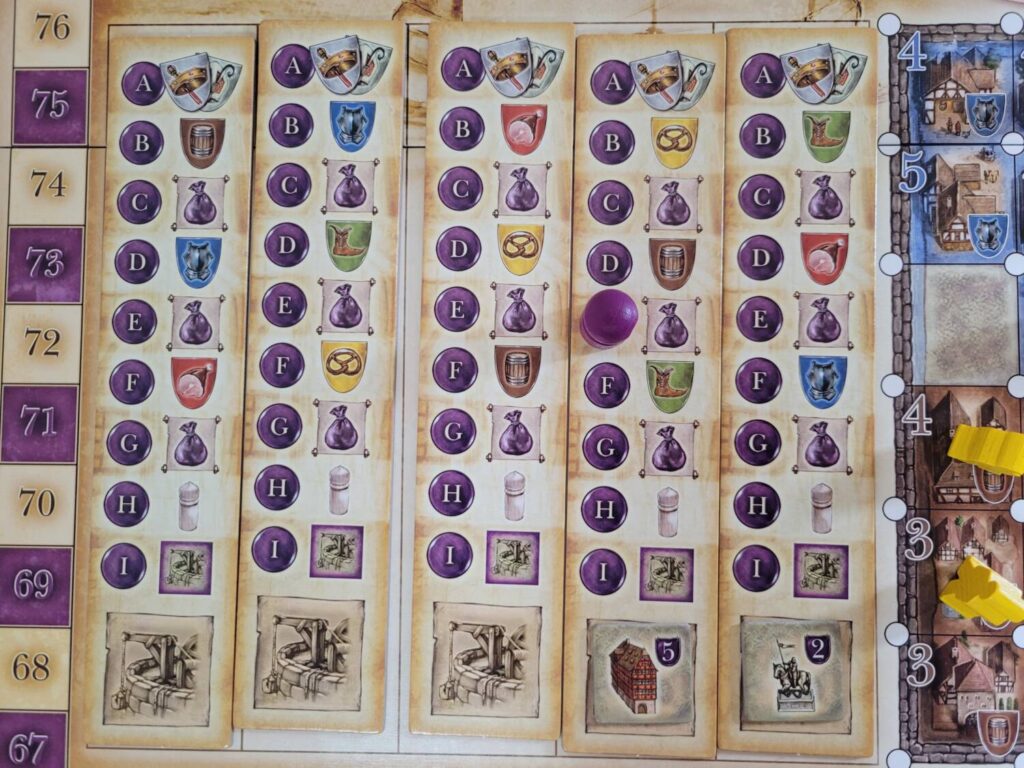
In the Action phase, the players will work their way down the column of the current Round card (from A to I), bidding on and performing the actions of each before moving on to the next. A player is never forced to bid on anything, but any Influence stacks not used in the current round are gone forever. Also, Influence stacks get used up whenever you use them to bid. If you bid anything during an action bid, then all the cards that were involved are removed from the game.
Deciding when to bid, and how much, is the lifeblood of the game. Bid too much in the early rounds and you may find yourself with no cards left to bid with in the later ones. It’s never an easy decision.
When it comes to taking actions, turn order matters. Your position in turn order can change from one action to the next. If you bid the highest for the current action, then you’ll be going first. Bid the least, and you’ll be going last. The higher you are in the turn order, the juicier the action is. If you’re too low, you may have to sit out altogether. It’s not a total wash, though. If you bid and cannot take an action, you get to take one of the cards you bid with and add it to the bottom of your deck of cards before discarding the rest.
The actions are pretty straightforward. In Step A, the players will be bidding to place their Family Members into the Nobility and Church seats in the Council. In Steps B, D, and F, the players will be bidding to influence a specific guild, gain one of the Goods tiles belonging to that guild, and/or place a Family Member into a city space belonging to that guild (paying the cost in coins associated with doing so). Depending on their position in turn order, the player may be performing all, or just a few of those possible actions.

In Steps C, E, and G, the players will be bidding to influence merchants. The player in first place will have the opportunity to sell Goods tiles to the supply to receive coins equal to the sum of the numbers printed on those Goods tiles. Then, they also place one of their Family Members into the Merchant’s Council seat. In Step H, the player whose Family Member is sitting in the Church’s Council seat can build a chapel anywhere on the board. In Step I, the player whose Family Member is in the Nobility’s Council seat may construct that round’s edifice anywhere on the board.
Finally, in the Council phase, players earn prestige points equal to the number of their Family Members in the Council. The player with the most Family Members also earns a Privilege. These can be traded in later to allow a player to go last in turn order when bidding, allowing them to see what others are going to do before deciding what to do themselves.
The End Game
A game of Strasbourg ends after five rounds. At the end of the game, the players earn points for Family Members in the Council, Family Members placed adjacent to Chapels and Edifices within the city, unused Privilege tokens, and fulfilled Task cards. Unfulfilled Task cards will cost the players points. The player with the most Prestige wins.
Thoughts
For me, Strasbourg is simultaneously one of Stefan Feld’s best, and also worst, games. The game is structurally sound, but the three-player minimum almost makes the game a non-starter for me. Thankfully, there’s a very easy to manage two-player variant on Boardgamegeek. Were it not for that, Strasbourg would likely have sat on my shelf untouched for much longer than it did. I have only ever had occasion to play it at a larger player count once and, wow, did that change the dynamic.
Using the two-player variant, there’s always some uncertainty when it comes to bidding. However, since the dummy player is only ever using a single card to bid, I always know that I will be able to at least come in second place if I bid at least seven. And, if I’m able to build my strategy around second place, basking in the occasional first place win, then I’m golden. It’s still challenging, but it’s an easy challenge, a climb to the top of a mildly inclined hill versus a hike up the side of a mountain.
But, when you toss a third or fourth player into the mix, everything changes. The uncertainty begins to creep in. Is that person’s facedown Influence stack just a couple of ones meant to fake you out, or is it two high numbers, a serious bid? Maybe you should consider making your own stacks of low numbered cards to fake them out instead. Should you sacrifice an Influence stack on an action you’re not concerned about to try to draw out your opponent so that when it comes to the action that you actually want, they won’t have anything left to bid with? And, I haven’t even touched on the thrill of trying to suss out, and hopefully block, the criteria on your opponents’ Task cards.

Yes, at higher player counts, Strasbourg quickly becomes a game of cat and mouse where both animals have cleverly disguised themselves as the other. It all becomes wonderfully confusing and will have your brain tying itself in knots. I love it.
Feld aficionado or not, Strasbourg is definitely a game you should give a try if you ever get a chance, and if you can actually get your hands on a copy. Even if you can’t, judging by the history so far of Queen Games’s Stefan Feld City Collection, it would not surprise me if Strasbourg didn’t get revisited, reimagined, and reworked as one of their upcoming games in the series.


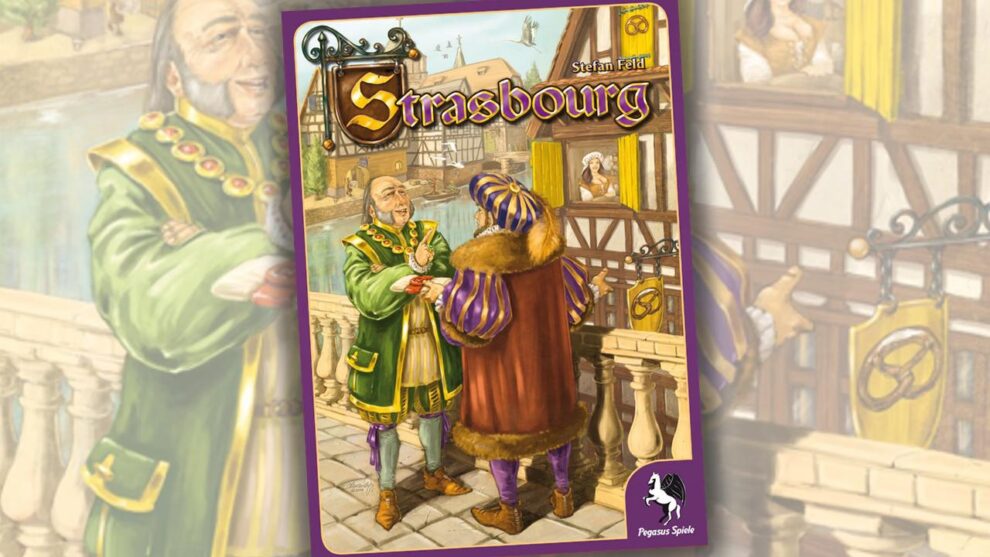

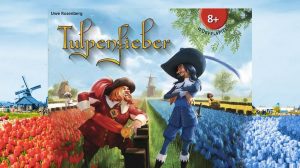






Add Comment